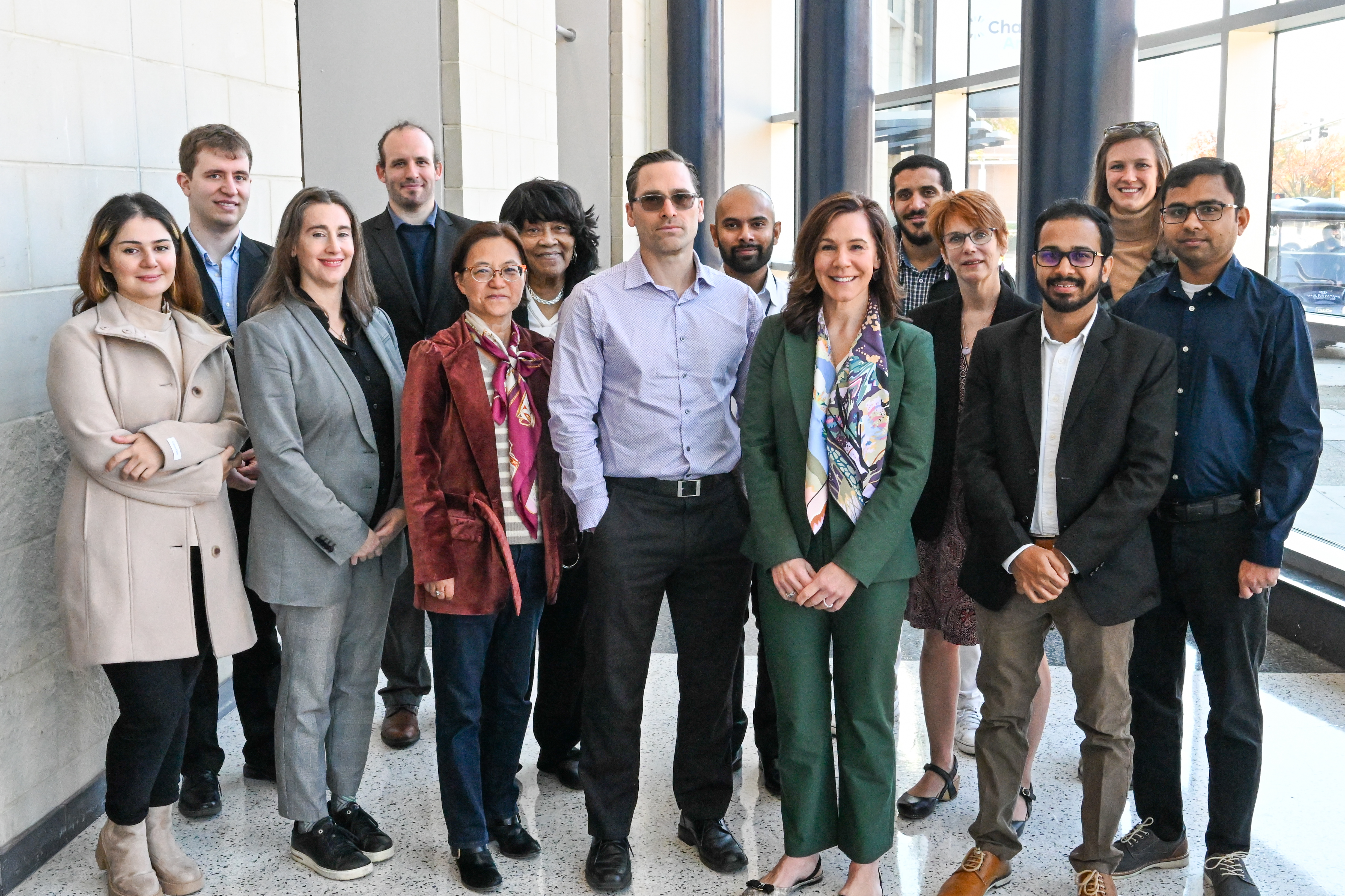The Joint Institute on Advanced Computing for Environmental Studies – or ACES, for short – is co-founded by Heather Richter, an ODU research professor who also serves as the executive director of the Hampton Roads Biomedical Research Consortium, and Malachi Schram, who leads Jefferson Lab’s Data Science Department. (Photo courtesy of Old Dominion University/Chuck Thomas)
Collaboration will leverage data science in tackling critical issues and disparities in Hampton Roads
NEWPORT NEWS, VA – Old Dominion University and the U.S. Department of Energy's Thomas Jefferson National Accelerator Facility share a bond that goes back nearly 40 years, to the lab’s founding in 1984. Now, they’re taking their partnership to a new level.
The fellow research institutions are launching a unique joint institute that will leverage Jefferson Lab’s specialties in data science and computing in an effort to tackle the most pressing problems and disparities at the intersection of health and the environment in Hampton Roads.
“Today, we make an announcement that takes a bold step forward in our historic partnership,” ODU President Brian O. Hemphill said during Friday’s State of the University Address at Chartway Arena in Norfolk. “This joint institute brings together interdisciplinary expertise to address critical scientific questions in medicine, public health, and climate in the context of the broader environment.”
The Joint Institute on Advanced Computing for Environmental Studies – or ACES, for short – is a center for enterprise research that will be housed within ODU’s new School of Data Science. It is co-founded and co-directed by Heather Richter, an ODU research associate professor who also serves as the interim executive director of the Hampton Roads Biomedical Research Consortium, and Malachi Schram, who leads Jefferson Lab’s Data Science Department.
ACES has assembled a team of scientists and university faculty from diverse fields such as public health, geography, environmental health, computer science and physics. They’ll work together through joint appointments and shared research staff – while also training students.
“For students, it’s a significant opportunity because of the world-class faculty and researchers that they are going to have opportunity to learn from and work with,” Hemphill said after the address.
But it’s not purely an academic pursuit. The aim is to provide real solutions to complex, regional problems such as the systems that drive disease and rapid environmental changes.
“Our health outcomes reinforce the way we experience the environment,” Richter said. “Essentially, there are social determinants of health and there are physical, environmental determinants. We are interested in understanding how those come together to make sense of the underlying distribution of disease in a population so that we can find ways to intervene.”
This will be done by applying data science and advanced computational approaches such as machine learning (ML) and generative artificial intelligence (AI).
“The Department of Energy has an impressive legacy of tackling really difficult problems,” Richter said, “and in bringing in some of the leading scientists in the world to do that.”
Partners already on board include the Hampton Roads Sanitation District, Children’s Hospital of The King's Daughters, and Eastern Virginia Medical School.
Another big piece of the puzzle is public participation in the research.
“The goal is to apply to the most advanced and innovative analytics we have available to come up with better, more effective solutions for well-being,” Richter said. “Part of what will make us successful is being able to engage the community.”
Jefferson Lab’s role
Weeks before the launch of ACES, the DOE announced Jefferson Lab would become the home of a new computational resource – the High Performance Data Facility Hub.
The $300+ million HPDF is still years from fruition, but the joint institute’s team is already thinking of ways to incorporate the new user facility’s potential into their plans. In the meantime, ACES will rely on the wealth of computational and data resources already existing at the lab.
Schram is a nuclear physicist who specializes in data science, with expertise in ML and AI. These approaches can be used to model complex and high-dimensional systems, such as flooding and air quality, that are impacted by climate change. In addition, advanced ML-based computer vision can help analyze medical images for faster diagnosis.
“It's a question of how we apply these techniques, these advances in computer science and data science, to help with regional topics,” Schram said. “It's definitely already grown well beyond what we expected.”
But it’s more than just crunching numbers. Simply collecting all that information and finding quality data is a challenge in and of itself. Meanwhile, understanding and interpreting the data may lead to mistakes.
“The other thing is unintentional bias,” Schram said. “If I start making an analysis and assume everything is statistically equal, then I'm going to get a wrong answer. I'm going to have some intrinsic biases since the sampling method might be biased.”
And sometimes, the machine learning models themselves can’t be trusted.
“One of the focuses of Jefferson Lab is uncertainty quantification,” said Diana McSpadden, a data scientist working with Schram and Richter on the ACES team. “Say we trained on data from one particular population or set of environmental characteristics, but now you're asking for prediction on a population that we were not trained on. So, you give a corresponding uncertainty for this prediction. It's a particular expertise that we can bring.”
Meanwhile, ODU and the other ACES partners provide further resources and knowledge in environmental, health and social sciences.
“That legacy of excellence and the creativity to explore different ways of doing things is the special blend here,” Richter said. “That’s why this is a cool opportunity for both sides.”
Further Reading
ODU President Announces Jefferson Lab Research Partnership, Barry Art Museum Expansion in State of the University Address
Jefferson Lab to Lead $300+ Million High Performance Data Facility Hub
Undergraduate Research at Jefferson Lab
By Matt Cahill
Contact: Matt Cahill, Jefferson Lab Communications Office, cahill@jlab.org



